THE HOTTEST YOUNG CHEF IN NEW YORK CITY
Interview ©2013
Daniel Humm’s restaurant, Eleven Madison Park (at East 24th Street) in the Flatiron district, which he’s co-owned since 2011 with Will Guidara, his general manager, has three Michelin stars and four stars — the highest ranking — from The New York Times.
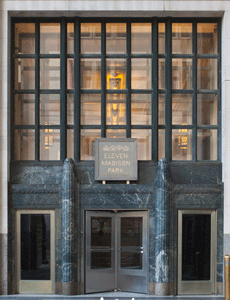
Eleven Madison Park, exterior
Eleven Madison Park didn’t start off life as a fine dining restaurant. Danny Meyer, whose many projects include Union Square Café, Il Maialino, Gramercy Tavern, and Shake Shack, opened it as a brasserie in 1998. Seven years later he brought in Humm, a young (then aged 28), precocious, wizard-chef, who had apprenticed for three years from the age of 14 at the Kurhotel Schinznach-Bad before working at several Swiss five-star hotels including a position as Chef Hors d’Oeuvrier and Chef Rotisseur at Zurich’s Hotel Baur au Lac and for five years at the then Michelin three-star Le Pont de Brent in Montreux under Gérard Rabaey. Humm earned his first Michelin star in less than a year and was also named “Culinary discovery in Switzerland 2002” by Gault Millau during his first Executive Chef position at Gasthaus zum Gupf, located near the medieval university town of St. Gallen in the Swiss Alps. In May 2003 he moved to San Francisco’s Campton Place Restaurant
In 2012 he was voted Best Chef in America by a jury of his peers for the James Beard Awards and Eleven Madison Park climbed 14 points to rank at number 10 in the World’s 50 Best Restaurants list. The same year Humm and Will Guidara also opened a new less rarified, less expensive and more populist restaurant called NoMad in the beaux-arts hotel of the same name only a few blocks away from Eleven Madison Park at 1170 Broadway. Last May, when she was in New York, Lucy Gordan, Epicurean-Traveler.com’s Bureau Chief for Europe, talked with Humm about his lightening-bolt culinary career. She had already met him at Milan’s 2013 edition of IdentitàGolose where he was judged “Best Foreign Chef of the Year.”
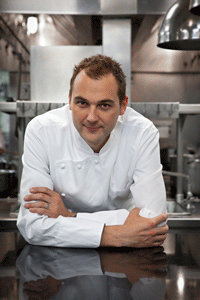
Daniel Humm
Our tastes in food are closely connected to our childhood; what are your first memories of food?
DH: The seasons in Switzerland are very distinct and pronounced and our food is very seasonal. For example, during the autumn we have a lot of game, braised meats and braised root vegetables, but then in the summer we have beautiful cherries and fresh fruits. My Mom is an amazing cook. She’s always cooked two meals a day every day. There would be too many special dishes to mention here. I don’t remember one special dish in particular. Her best dishes were seasonal. She is a superb baker as well. We only ate her freshly baked bread at home. We only bought fruit and vegetables at farmers’ markets. Otherwise we never went to the grocery store. Everything we ate was homemade.
Your father is an architect and hoped you’d follow in his footsteps; when and why did you decide to become a chef?
DH: I knew early. I knew when I was ten years old that I wanted to be a chef. It was my vocation. I loved helping my mother to bake, kneading the dough, working with my hands, seeing the results, being able to taste them, and making people happy. I learned the basics from my mother. Then she let me make my own dishes.
What was the first thing you liked to make?
DH: Bread. I especially loved to make bread and baked goods because of course as a kid I was a sweet-tooth.
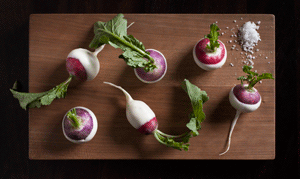
Radishes, NoMad
Are you still?
DH: Yes, a little bit still.
Any particular sweet?
DH: I loved the chocolate croissants that my Mom makes. Being Swiss, of course I’ve always loved chocolate.
Gérard Rabaey was your mentor. What did you learn from him? Was it precision, respect for ingredients, and organization, and how to bring out each ingredient’s unique taste?
DH: He was my greatest mentor. I worked with him for five years at a very crucial time in my career. He was the real deal. He worked in the kitchen from seven in the morning until midnight. In thirty years he never missed a service. He was always there. He taught me discipline, precision, creativity, but also letting the product speak for itself. His specialties were sweetbreads, kidneys and game, especially pheasants, many dishes you don’t see on menus anymore.
What are the essential qualities of a top chef?
DH: Work hard and know what you want as far as what type of cuisine. There are so many cuisines out there to choose from: Japanese, Chinese, French, Italian, Spanish… They are all interesting, but you can’t be good at everything. You’ve got to pick where you want to be and who you are. My favorite style has always been French cooking.
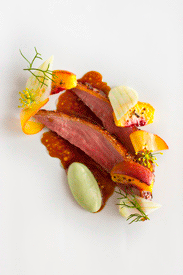
Duck at Eleven Madison Park
What do you like best about your job?
DH? Working with people, with fresh products, the fact that I can make people happy. You can have an idea; you can produce it, and then you can see the result within hours. I love that.
The least?
DH: I know this will sound dumb. I don’t know. I can’t think of anything. Many chefs say the lack of time with the family, but I think any job you do well takes a lot of work and your time. I don’t focus on the negative aspects.
What’s your culinary philosophy?
DH: You are only as good as your last meal. You have to do it every day. We create a dish and then we have to redo it or something else at that same level or better every day. The pressure is satisfying every guest every night. A few years ago Will and I saw a quotation at the Museum of Modern Art by Willem de Kooning. It said: “I have to keep moving to stay the same.” That’s kind of what we feel here at Eleven Madison Park. We have to keep changing otherwise we lose something.
In a nutshell how would you define your cuisine?
DH: Of New York, of this place and of the moment. By of New York I mean using exclusively the best local ingredients, using the traditions from here in a way that people want them today.
What are your signature dishes, other specialties? Are they the same at NoMad?
DH: We don’t have signature dishes at Eleven Madison Park because we change the menu all the time. My guests decide which dishes are my best. It’s for them to decide. I’m proud of all of my dishes. If we serve it, I’m proud of it.
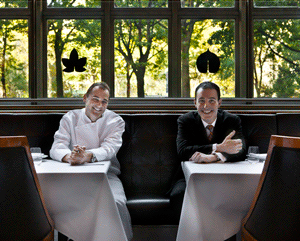
Chef Humm and partner Will Guidara
Do I understand correctly that you offer at lunch and at supper on the same day a $195.00 tasting menu so that you no longer propose to your guests an ingredient grid or an à la carte menu?
DH: Yes, that’s right. We no longer have an ingredient grid or an à la carte menu, only our tasting menu. Yes, usually the tasting menu is the same at lunch and at supper on the same day. It has fifteen courses.
Can you explain the order of the tasting menu’s dishes?
DH: The order changes but, since we’re in New York, we usually start with oysters and serve black and white cookies for dessert. Some of our courses are more interactive, communal in the middle of the table. It’s really like a journey, you know. It’s always a journey, though some elements stay the same.
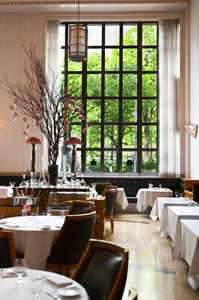
interior of Eleven Madison Park
So how would a guest know what you will be serving today and if he or she will like the choices or if they would have preferred yesterday’s or tomorrow’s tasting menu?
DH: They don’t know. If they’re allergic to something, we will serve them something else.
Do you offer wine pairing with your tasting menu?
DH: Yes, it’s an option or you can order wine separately.
Are there tasting menus only at NoMad too?
DH: No, only à la carte, but unlike here at Eleven Madison Park, we do have a specialty there. It’s roast chicken. We change its accompanying side dishes according to the season.
By the way, what is the derivation of the name NoMad? Is it named with you in mind?
DH: NoMad because it’s in a hotel and people stay there from all over the world. It also means north of Madison Park. It has two meanings.
There are chefs like Alain Ducasse, Thomas Keller, and Alfonso Iaccarino who own restaurants all over the world. As of last year you own two restaurants not far from each other here in Manhattan. Isn’t it unusual to have two restaurants so close to each other; how do you divide your time between them?
DH: Yes, it’s unusual but it’s on purpose that they are so close. It’s so I can be in both places every day. It’s important to me that I can walk back and forth between them.
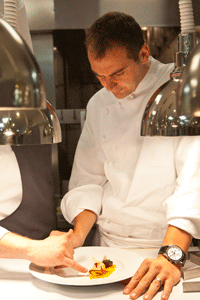
Humm in the kitchen
Do you have a routine?
DH: No, I don’t. I haven’t figured one out. How I divide my time between them depends on what’s going on in each place that day. Every day is a little different, but it’s only a four-minute walk between them. I’m still trying to figure out how to divide my time between them. They each have their own style and I like this difference of creativity.
You have four stars from The New York Times, three Michelin stars, and the IdentitàGolose guide designated you “Best Foreign Chef of the Year.” What do you think are the reasons for your success?
DH: Hard work and my amazing team. I’m really proud of my team. Our success is a team effort. The team comes from over twenty countries. New York is a great place because the people who live here come from all over the world. I really am happy here.
Up to now we’ve talked about Daniel Humm the chef; I’d like to know more about Daniel Humm the person. For example, what are your favorite foods?
DH: I love my Mom’s roasted rabbit with bacon, pearl onions, and orange. My wife is a great cook too so we almost always cook at home here too.Yes, she’s American. Yeah, I just love food. It would be hard for me not to be able to eat gluten and baked goods. No sugar would be hard too.
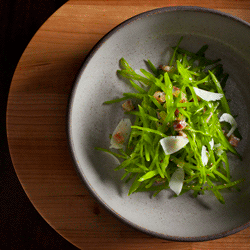
Green Beans, NoMad
You were born and grew up in Zurich, but besides your own cooking is there a national cuisine that you love the most?
DH: No, not really. I love Italian; I love Japanese; I love French. I really love going to new places and experiencing their cuisines, anywhere in the world, it’s very interesting. I really love food.
How often have you been to Italy?
DH: A lot of times. I’ve been all over Tuscany. I love Tuscany. I also ride my bike and Tuscany is a great area for bike riding. I love Rome. I love Florence. I love Venice for a day. Yeah, I wouldn’t want to be there for a week. I love Italy, especially the food products and cuisine. It’s very comforting and very homey. As you know, Italy’s a great country.
An Italian chef that you particularly admire? A restaurant in Italy that you especially love?
DH: Massimo Bottura. His “Osteria Francescana” is amazing.
The amazing thing about Italy is that there are so many great restaurants, not only famous restaurants, but small places that you might not have heard of where you get great meals.
What is never missing in your refrigerator at home?
DH: Grapefruit. I love grapefruit.
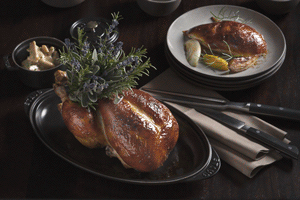
Roast Chicken at NoMad
If you were on Death row, what would you order for your last meal?
DH: Roast chicken.
A dish you dislike?
DH: It doesn’t exist. No.
Your favorite wines?
DH: Château Rayas. It’s in France in the Rhone Valley.
You are Swiss and have already confessed to loving chocolate and being a sweet-tooth, so what’s your favorite dessert?
DH: I don’t have a favorite dessert, but I have a favorite chocolate: Reichmuth von Reding. It’s made in the heart of Switzerland.
Chefs are well-known for having collections, often of motorcycles, fast cars, or watches; what about you?
DH: Bicycles. I have eight.
Other chefs that you admire and why? Are they Thomas Keller, Daniel Boulud, Alain Ducasse, and Michel Bras?
DH: I think that all of them at some point were ahead of their time.
Your hobbies?
DH: Skiing, snowboarding, running marathons (I’ve done Zurich, San Francisco, London, New York, Paris, Boston), and bicycling.
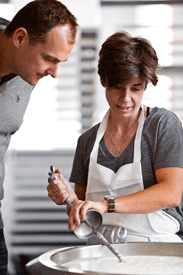
What do you miss the most about Switzerland?
DH: The mountains.
Where do you like to go on vacation?
DH: Provence.
Your favorite cooking utensils that you would never be without?
DH: A cake tester. I use it for meat and fish.
You are a world-famous chef, but you too have received some negative reviews; what is your opinion of food critics and guides? What was your reaction to the negative reviews; were they devastating or challenging? DH: You always have to learn. We try to, we have to learn every day from everyone’s opinions, what they like and don’t like. Every day we try to do the best we can. I would hope that in the future people will look back at Eleven Madison Park and say what I told you about Keller, Ducasse, Boulud and Bras: “Those guys at Eleven Madison Park were ahead of their times.”
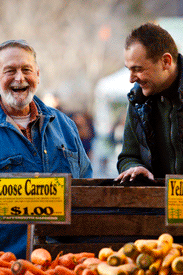
Hmm shares a laugh at the Farmers’ Market
I’ve read that if you hadn’t become a chef, you’d have become a professional cyclist, is that right?
DH: Yes.
What is your dream for the future? Is it to leave a legacy? Is your goal to change fine dining habits? If so, in what ways?
DH: New York is home. I and the team will keep working hard. I’m young you know. Things are good now, but they could possibly get better.
Why have you settled on a tasting menu?
DH: It gives me a chance to be more creative and more focused. It’s easier to tell a story with a tasting menu. People come here from all over the world and it’s kind of nice to take them on a little ride. Of course, the ride reflects the season, my mood… I go out every day and search for my products and then my suppliers all become friends. We’ve been working with some of them for years. I feel like they are a big part of what we do, of our success.
& & &
